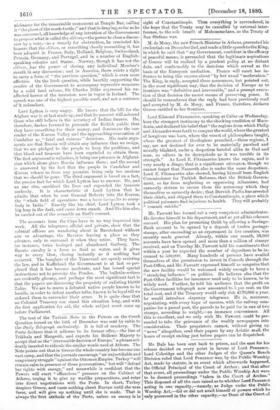Mr. Dale has been sent back to prison, and the
ease for his release decided on every point in favour of Lord Penzance. Lord Coleridge and the other Judges of the Queen's Bench Division ruled that Lord Penzance was, by the Public Worship Act, made by statute, in an event which afterwards happened, the Official Principal of the Court of Arches ; and that after that event, all proceedings under the Public Worship Act were to be deemed proceedings "taken in the Court of Arches." This disposed of all the case raised as to whether Lord Penzance acting in one capacity,—namely, as Judge under the Public Worship Act,—did or did not avail himself of powers which he only possessed in the other capacity,—as Dean of the Court of
Arches, for it decided that there was a statutory power given him to use, in either capacity, the powers given him in the other. As to the assertion that the Bishop of Exeter acted for both the Bishop of London and the Archbishop of Canterbury, when he should have acted only on behalf of one of the two, the Court decided that there was nothing to prevent the same person acting for both, but that in point of fact there was no need of any substitute for the Bishop of London at all, who, being the patron of the living, had nothing to do but to send on the refer- ence to the Archbishop, as being a matter with which, in con- sequence of his being patron, he had nothing to do, so that the Bishop of Exeter was really acting for the Archbishop alone. Finally, as to the assertion that the Public Worship Act gives no power of imprisonment against contumacious clergymen who ignore its inhibitions, the Court admitted it, but pointed out that it did not in any way repeal the powers given to ecclesias- tical Judges under the 53rd George III., but that, on the con- trary, it made Lord Penzance an ecclesiastical Judge in an ecclesiastical Court, and, therefore, endowed him with all the general powers given to such ecclesiastical Judges in ecclesias- tical Courts by the older Act. We are very sorry for Mr. Dale, and wish he could be released, but we are bound to say that the judgment seems to be in every sense a sound, legal, and impartial one,—a judgment of law, and not of policy.







































 Previous page
Previous page